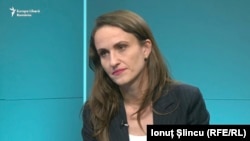BUCHAREST -- Other NATO members will provide troops to fill the void created by the departure of US soldiers from Romania, the country's Foreign Minister Oana Toiu told RFE/RL, leaving the alliance with a “stronger" presence.
Speaking to RFE/RL’s Romanian Service on October 30, Toiu said “of course, we all wanted this (US military) presence to continue unchanged or for there to be scenarios in which this presence will be increased.”
Nevertheless, she added, the decision by the United States was taken on the basis of a “justified analysis” by Washington, that European NATO members need to “increase our own defense capacity.”
The news of the troop cuts was officially announced by Romanian Defense Minister Ionut Mosteanu on October 29. He said about 1,000 troops would not be replaced after their recent rotation through Romania, but that a similar number would remain in three US bases in the country.
“By the end of this year and (the beginning of) next year, we will see…a stronger NATO presence in Romania and a stronger NATO capacity to intervene in case Romania is subject to a direct threat,” Toiu said.
Pressed by RFE/RL as to whether this would be composed of other allied nations, rather than American troops, she said “we are talking about allied forces, yes.”
Toiu’s comments echoed the tone taken by other Romanian officials to tamp down concern after news of the US withdrawal was announced.
Trump: 'Not A Big Deal'
Earlier on October 30, US President Donald Trump appeared to play down the importance of the decision as he spoke to reporters on Air Force One while flying back from South Korea to Washington.
“I can tell you about it but it's not very significant. It's not a not a big deal,” Trump said when asked about the military drawdown.
But the decision to reduce numbers has drawn unusual criticism from Republican defense policy experts in Washington.
In a joint statement, the chairmen of the Senate and House armed services committees, Roger Wicker and Mike Rogers, said they “strongly oppose” the move.
“Our European allies have agreed to shoulder historic levels of the burden of collective defense. However, European rearmament will take time,” the pair, both Republicans, wrote.
“Pulling back US forces from NATO’s Eastern flank prematurely, and just weeks after Russian drones violated Romanian airspace, undermines deterrence and risks inviting further Russian aggression,” they added.
US troop reductions in Europe have been expected for several months since it was announced the Pentagon would conduct a Global Force Posture Review.
There has been no official announcement of the United States reducing its military deployments elsewhere in Europe, but the move to cut troops in Romania comes amid heightened anxiety about the US commitment to NATO at a time when Russia has invaded Ukraine, sparking Europe's biggest and deadliest conflict since World War II.
In a statement on the force reduction, the US Army stressed that it maintained “a robust presence” in Europe to “meet objectives…including President Trump’s commitment to defend NATO allies.”
Nevertheless, Wicker and Rogers said they would seek assurances from the Pentagon that “as the President has previously stated, the two armored brigades in Poland remain in place, and that the United States continues to sustain a persistent rotational presence in Poland, the Baltic states, and Romania.”
Poland's Defense Minister Wladyslaw Kosiniak-Kamysz told reporters on October 29 that his country had "not received any information...about a reduction in the contingent in Poland."
'Romania Has Failed'
A Romanian Army reserve officer with decades of experience in national and NATO commands told RFE/RL that “Romania has failed to develop a direct relationship with the US, on the model of Poland, which was promised, through the voice of the US president, that 8,000 American soldiers would remain there."
Relations between Bucharest and the Trump administration were strained by Romania’s decision to cancel presidential elections last year, citing Russian election interference, after a relatively unknown candidate won the first round of voting.
The move was strongly condemned by US Vice President JD Vance, who said it was undemocratic, but pro-Russian nationalist candidate Calin Georgescu was in any case disqualified from the election rerun in May.
Toiu told RFE/RL that “trust is rebuilding” in the relationship with Washington. “It is not vulnerable. It is a partnership of mutual trust with common future objectives.”
Meanwhile, Estonia’s Defense Ministry issued a statement on October 30 saying Washington had decided to maintain its “military presence” in the country.
“We welcome the US decision to continue its troop presence in Estonia,” Defense Minister Hanno Pevkur was quoted as saying.
“The US administration has confirmed that the Baltic states and Poland are exemplary allies who have taken significant steps to strengthen their security by investing at least 5 percent of our economies in national defense.”
The 5-percent figure was agreed by NATO countries in June as a target to be achieved by 2035.
NATO estimates that, this year, Poland will spend 4.48 percent of its GDP on defense, the highest in the alliance. Latvia and Lithuania are in second and third place, with Estonia in fourth with 3.38 percent.
The alliance estimates that Romania will spend 2.28 percent. The United States will be at 3.22 percent, according to the NATO figures.













